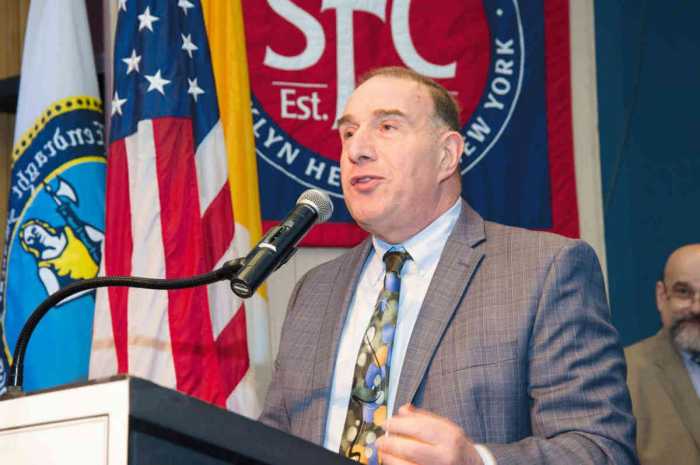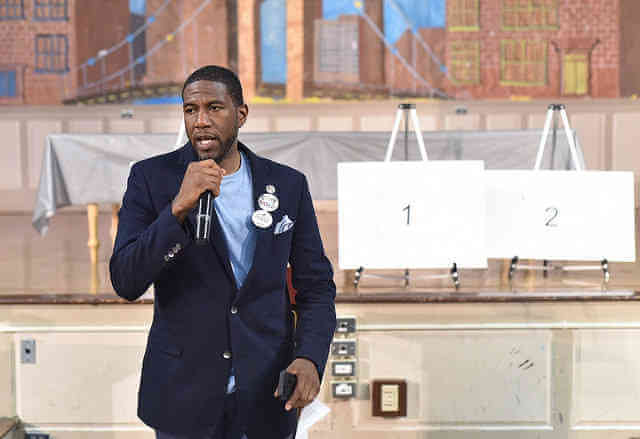Judith Clark, at the time of her prosecution in the Brink's robbery and murder case. | CANDLES FOR CLEMENCY
Sweeping clemency action by Governor Andrew Cuomo on December 30 – in which he commuted the sentences of seven felons, pardoned five others, and conditionally pardoned 101 nonviolent youthful offenders – came as welcome news to a longtime gay leader who in recent years has made rehabilitated convicts a key mission in his activism.
Allen Roskoff, who has been active in LGBTQ politics since the immediate post-Stonewall years, is the founder and co-chair of Candles for Clemency, which since 2009 has pressed for commuted sentences and pardons for convicts with demonstrable records of rehabilitation. Among the group’s actions have been several large rallies near Cuomo’s Westchester County home, and Roskoff has, at times, been a harsh critic of the governor, who up until last week has issued only a handful of clemency grants.
In the wake of the governor’s December 30 announcement, however, Roskoff sounded a different note.
Longtime LGBTQ politico pressed governor for years to reward rehabilitation
“We are excited to see that these elderly individuals receiving clemency will not have to die in prison,” he said. “This is a proud moment for New York and our state’s ability to lead the nation in criminal justice reform. Our efforts show that through activism and relentless efforts results can be achieved. Governor Cuomo’s heroic actions should serve as a model for our nation.”
Roskoff, who is president of the Jim Owles Liberal Democratic Club, an LGBTQ group, took particular satisfaction in the governor’s action regarding Judith Clark, a 67-year-old lesbian who was convicted for her role as getaway driver in the 1981 Rockland County Brink's robbery that involved the murder of two police officers. Clark was part of a group of radicals from the Weather Underground and the Black Liberation Army that staged the audacious daylight robbery.
Roskoff’s organization, which is co-chaired by Tony Hoffman, a former president of the Village Independent Democrats, has long emphasized Clark’s evident rehabilitation – she earned several degrees, taught pre-natal parenting classes for pregnant inmates, co-founded an AIDS group, and trained service dogs used by law enforcement and disabled veterans. An inmate at the Bedford Hills Correctional Facility for Women, Clark, in good measure due to the efforts of Candles for Clemency, won support from a broad swath of prisoners’ advocacy groups, attorneys, and celebrities, with more than 1,000 people writing Cuomo urging clemency for her.
Clark, however, was sentenced to a minimum of 75 years in prison – a longer sentence than most of those involved in the Brink's robbery and murders – and would not have been eligible for parole until 2056. Cuomo’s action did not release her from prison but rather commuted her sentence to a minimum of 35 years in prison, which means she will be eligible for parole this year.
In his statement making the clemency announcements, the governor cited Clark’s “exceptional strides in self-development,” and said of his decision to dramatically step up in his willingness to grant relief to long-time convicts, “With these actions, we have taken one more step toward a more just, more fair, and more compassionate New York for all.”
Activist Allen Roskoff at a 2014 Candles for Clemency rally near the Westchester County home of Governor Andrew Cuomo. | DONNA ACETO
According to Candles for Clemency, the national prison population grew from around 200,000 in the early 1970s to a high point of 1.6 million in 2009, that exorbitant growth fueled in good measure by the war on drugs. The roughly three percent decline in the prison population since 2009, the group asserts, is due to changing attitudes toward the crime-fighting efficacy of long prison sentences – as typified by a study from NYU’s Brennan Center for Justice it cited – as well as the work of prison reform advocates.
Still, Candles for Clemency noted, there are large numbers of elderly inmates serving long sentences handed down decades ago. The group cited statistics showing that over the past 13 years, New York State’s general inmate population has declined by 23 percent, while the number of prisoners over 50 has skyrocketed by 81 percent. That, despite the fact that recidivism among elderly ex-cons is low and the cost of providing health care to senior citizens in prison is a heavy burden on the state.
The New York Times, this week, published a detailed account of a visit Cuomo paid to Clark in prison early this past fall, where the only others in attendance were the Bedford Hills superintendent, the governor’s out gay chief counsel, Alphonso David, who formerly worked as an attorney at Lambda Legal, and a black Labrador that Clark had trained as a service dog.
“When you meet her you get a sense of her soul,” Cuomo told the Times. “She takes full responsibility. There are no excuses. There are no justifications.”
Roskoff recalled a conversation he and the governor had about Clark during a private meeting last summer at the Democratic National Convention in Philadelphia, where both were delegates (though in support of different candidates). He urged Cuomo to visit Clark, and when the governor said he would, Roskoff asked, “Can I hold you to it?” Cuomo responded, “Yes,” and Roskoff said, “Then we have to hug.” After they did so, Roskoff added, “You grant Judith clemency and you will be known nationally as the king of mercy.”
Not everyone shares the governor’s faith in Clark’s rehabilitation, of course.
Rockland County Executive Ed Day, a Republican who is a former NYPD officer, in a written statement called Cuomo’s action “a vicious slap in the face to every member of law enforcement. The blood of Nyack police Sergeant Edward O’Grady, Officer Waverly ‘Chipper’ Brown, and Brink's guard Peter Paige will be on her hands until the day she dies. Judith Clark is a domestic terrorist. Her only place in a civilized society is behind bars.”
But not every local politician echoed Day’s hard line.
Representative Sean Patrick Maloney, an out gay Democrat who represents Rockland County and other parts of the Lower Hudson Valley, issued a statement saying, “I want to commend Governor Cuomo for commuting the sentence of Judith Clark, a living example of the rehabilitative potential of our criminal justice system. Clark has served over 30 years in prison, repeatedly demonstrated remorse for her participation in the Brink’s robbery, and endeavored to better herself by earning college degrees and leading educational and health initiatives to benefit her fellow inmates, prison staff, and prison administration. Our prisons should focus on effective methods for rehabilitation and reentry, which includes permitting parole for low-risk, elderly offenders who have materially demonstrated their reformation. Judith Clark deserved to spend many years in prison for her role as an accessory to the terrible crime that resulted in the death of two police officers and a security guard, but after nearly 35 years she has been punished and no longer poses a threat to our communities.”




































